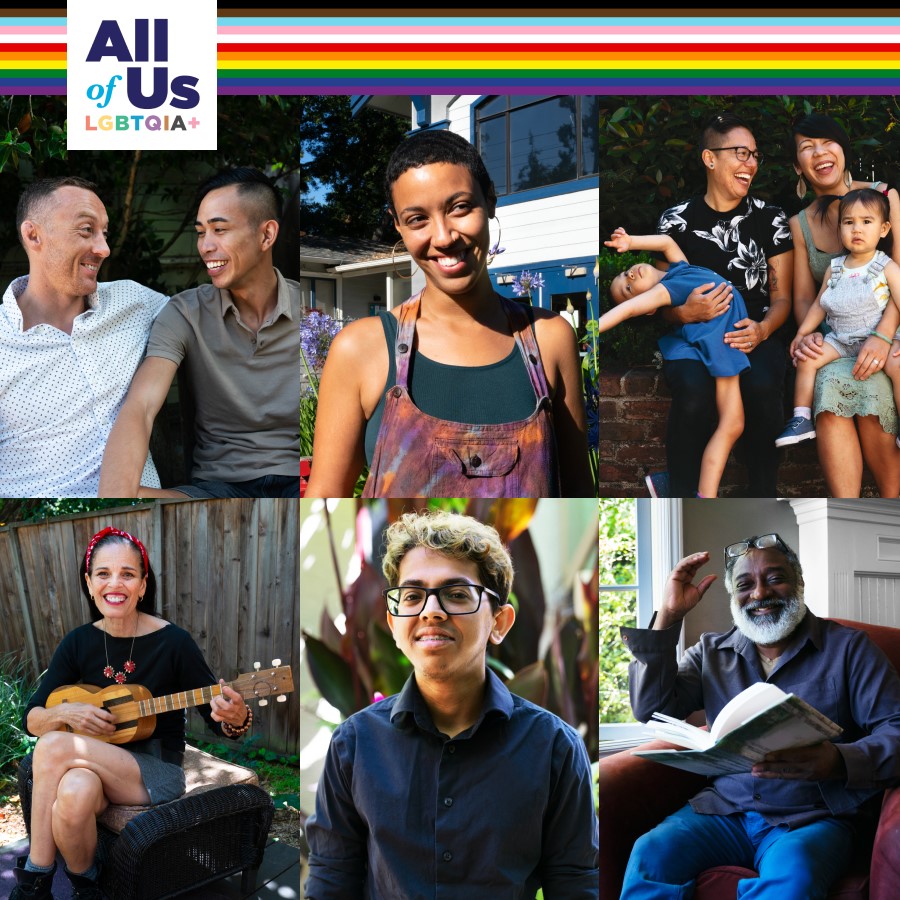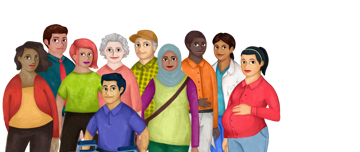
To further advances in precision health, the All of Us Research Program is committed to engaging participants from all backgrounds and experiences, especially those underrepresented in biomedical research. Historically, lesbian, gay, bisexual, transgender, queer, intersex, and asexual (LGBTQIA+) people were often not represented as participants in medical studies because gender identity and/or sexual orientation were not always recorded. Additionally, many LGBTQIA+ people mistrust medical research and health care more generally due to experiences of discrimination and stigmatization. Because of this, the health of the LGBTQIA+ community is understudied. All of Us is working to change that.
Visibility in Research
Even today, clinical trials and epidemiological studies do not always ask questions about participants’ sexual orientation and gender identity. When they do, many only include response options within a binary that do not reflect the diversity of experiences that exist. Consequently, LGBTQIA+ people are still underrepresented or misrepresented in health research.
All of Us has sought to do things differently, by including questions on sexual orientation, sex assigned at birth, and gender identity in its initial demographic survey, “The Basics,” with a broad range of answer choices. This allows participants to offer a more complete picture of their lives. The program also makes resources available to researchers to help define the terms and ensure appropriate analyses of these data elements.
The Researcher Workbench currently includes data from more than 413,450 participants. About three-quarters of those participants are from communities underrepresented in biomedical research, including racial and ethnic minority groups and sexual and gender minority (SGM) populations.
“The invisibility that LGBTQIA+ people have faced in clinical research for decades is being addressed by All of Us,” said Stanford University’s Mitchell Lunn, M.D., M.A.S., co-director of The PRIDE Study and PRIDEnet. The PRIDE Study is a national, longitudinal cohort study of SGM adults. PRIDEnet is an organization that catalyzes LGBTQIA+ health research through community engagement and has served as an All of Us community engagement partner since the beginning of the program.
According to All of Us Chief Engagement Officer Karriem Watson, D.H.Sc., M.S., M.P.H., PRIDEnet’s involvement was a priority from the start. “All of Us is focused on meeting communities that have been historically underrepresented in biomedical research where they are,” he said. “As a National Community Engagement Partner, PRIDEnet has been integral to building trust for the program within the LGBTQIA+ community.”
Dr. Watson further explained, “The inclusion of LGBTQIA+ people has been part of All of Us’ plan from the outset. With the support of PRIDEnet and other organizations, All of Us is building one of the most diverse datasets of its kind. Currently, about 14% of participants with data available in the Researcher Workbench identify as LGBTQIA+.”
Expanding LGBTQIA+ Research with All of Us
The breadth, depth, and diversity of the All of Us dataset make it possible to address focused research questions about LGBTQIA+ health and to conduct nuanced statistical analyses. For example, groups can be studied based on their multiple intersecting identities (e.g., health experiences of people who are transgender and African American). The health of SGM people can also be compared directly to the health of their non-SGM counterparts—because the dataset contains samples of both groups.
The size of the sample makes it possible to research questions that are focused on subgroups within the wider LGBTQIA+ umbrella. For example, Annesa Flentje, Ph.D., associate director of The PRIDE Study and its site director at the University of California, San Francisco, is using All of Us data to explore whether stress among SGM people leads to biological differences in inflammatory markers among those with and without HIV.
“That is the type of question you wouldn’t be able to ask unless you had a really large dataset of sexual and gender minority people and their biometric measures. All of Us creates a large enough sample size for statistically meaningful questions to be asked,” she said.
Dr. Flentje’s research with All of Us data is supported by an NIH grant. She’s also looking at how stress levels relate to substance use across different SGM groups.
“It’s been fun to be able to do this research project because PRIDEnet has done so much outreach and support for All of Us. It’s been really incredible to actually be able to come in and use the data and see what that side of things is like in the Researcher Workbench after partnering with All of Us to engage and now enroll participants,” she said.
The availability of All of Us data may also motivate other researchers to study the health of LGBTQIA+ people, even if the LGBTQIA+ community is not their primary research focus. “It’s a smaller lift to look at your data by sexual orientation or gender identity because the data have already been collected in All of Us," explained Karen Parker, Ph.D., M.S.W., director of the NIH Sexual and Gender Minority Research Office. Dr. Parker suggests that this dataset might help build the field of SGM research as Ph.D. students, for example, harness its potential in their dissertations. “We want more people focused on SGM research, and we want people–no matter what they study—to consider SGM populations in their research,” she said.
Improved Care for LGBTQIA+ Patients
All of Us may soon have the world’s largest biomedical dataset of people who identify as LGBTQIA+, according to Dr. Lunn. He believes the potential for future scientific research is enormous because of the combination of data types available through the Researcher Workbench.
“We’ll have wearable data, and we’ll have whole genome sequences. There’ll be a bunch of things that will help accelerate LGBTQIA+ health research,” he said.
By furthering research about LGBTQIA+ communities, All of Us may ultimately improve patient care. Dr. Lunn suggests that researchers using the All of Us dataset could provide evidence-based studies that will one day shape how medical students learn to provide the most inclusive care for LGBTQIA+ people.
In addition, he hopes that the dataset will help researchers document how stigma and discrimination have affected LGBTQIA+ people’s physical and mental health and their resilience.
“It’s not all doom and gloom all the time,” Dr. Lunn said. “What makes LGBTQIA+ people resilient? We’ve been around for centuries to millennia. How do we stay resilient in the face of discriminatory policies or life experiences? These are questions we can address in the future.”
Visit ResearchAllofUs.org to explore the data available and begin your research.
This article appears in the June 2023 issue of All of Us Research Roundup. Subscribe to receive future issues of the bimonthly researcher newsletter.
View the full June edition of the All of Us Research Roundup here.
All of Us is a registered service mark of the U.S. Department of Health & Human Services (HHS).
 U.S. Department of Health & Human Services
U.S. Department of Health & Human Services

